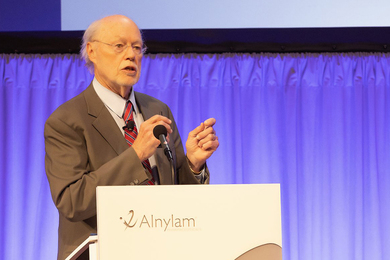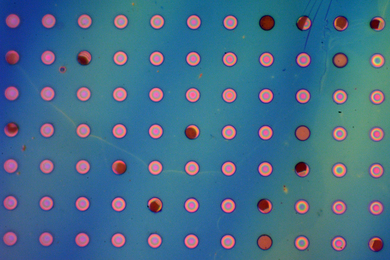Four MIT faculty members have been awarded National Institutes of Health (NIH) grants designed to promote innovative biomedical research.
The Institute’s recipients of these new NIH grants are Hidde Ploegh, professor of biology and member of the Whitehead Institute; Feng Zhang, assistant professor of brain and cognitive sciences and member of the McGovern Institute; Jeff Gore, assistant professor of physics; and Emery Brown, professor of brain and cognitive sciences.
The NIH is awarding approximately $155 million to 81 researchers across the country through its High Risk High Reward program, supported by the NIH Common Fund, which funds innovative and risk-taking research programs. The awards are divided into three categories: the NIH Director’s Pioneer, New Innovator and Transformative Research Projects awards.
Ploegh received one of 10 NIH Director’s Pioneer Awards, which support exceptionally creative scientists working to solve major challenges in biomedical and behavioral research. He plans to leverage unique protein-labeling technology developed in his lab to identify the targets of single-domain antibodies in large-scale fashion and to explore how such antibodies could be used to alter intracellular activity and cellular function. He plans to apply the approach in such model organisms as Drosophila melanogaster and Caenorhabditis elegans.
Zhang also received a Pioneer Award, to fund his research probing neuropsychiatric diseases using targeted epigenome and genome engineering.
Gore will receive one of 51 NIH Director’s New Innovator Awards, which support promising new investigators with highly innovative projects. He plans to use the grant to study possible early warning indicators of impending tipping points — such as a disease outbreak, population collapse, cellular differentiation, or cancer metastasis — experienced by biological systems. Gore plans to study system fluctuations that can serve serve as warning indicators in laboratory microbial populations, then within individual cells.
Brown, who is receiving one of 20 NIH Director’s Transformative Research Awards, will work with MIT faculty members Ed Boyden and Matt Wilson, as well as Ken Solt of Massachusetts General Hospital, to redesign general anesthesia. The research project will combine optogenetic, electrical and pharmacological manipulations in rodent models to create this behavioral-physiological state through precisely timed control of specific brain circuits. If successful, this research will provide a new fundamental understanding of brain arousal control, new anesthesiology practices, and possibly novel therapies for arousal disorders such as depression, insomnia, pain and coma.
The Institute’s recipients of these new NIH grants are Hidde Ploegh, professor of biology and member of the Whitehead Institute; Feng Zhang, assistant professor of brain and cognitive sciences and member of the McGovern Institute; Jeff Gore, assistant professor of physics; and Emery Brown, professor of brain and cognitive sciences.
The NIH is awarding approximately $155 million to 81 researchers across the country through its High Risk High Reward program, supported by the NIH Common Fund, which funds innovative and risk-taking research programs. The awards are divided into three categories: the NIH Director’s Pioneer, New Innovator and Transformative Research Projects awards.
Ploegh received one of 10 NIH Director’s Pioneer Awards, which support exceptionally creative scientists working to solve major challenges in biomedical and behavioral research. He plans to leverage unique protein-labeling technology developed in his lab to identify the targets of single-domain antibodies in large-scale fashion and to explore how such antibodies could be used to alter intracellular activity and cellular function. He plans to apply the approach in such model organisms as Drosophila melanogaster and Caenorhabditis elegans.
Zhang also received a Pioneer Award, to fund his research probing neuropsychiatric diseases using targeted epigenome and genome engineering.
Gore will receive one of 51 NIH Director’s New Innovator Awards, which support promising new investigators with highly innovative projects. He plans to use the grant to study possible early warning indicators of impending tipping points — such as a disease outbreak, population collapse, cellular differentiation, or cancer metastasis — experienced by biological systems. Gore plans to study system fluctuations that can serve serve as warning indicators in laboratory microbial populations, then within individual cells.
Brown, who is receiving one of 20 NIH Director’s Transformative Research Awards, will work with MIT faculty members Ed Boyden and Matt Wilson, as well as Ken Solt of Massachusetts General Hospital, to redesign general anesthesia. The research project will combine optogenetic, electrical and pharmacological manipulations in rodent models to create this behavioral-physiological state through precisely timed control of specific brain circuits. If successful, this research will provide a new fundamental understanding of brain arousal control, new anesthesiology practices, and possibly novel therapies for arousal disorders such as depression, insomnia, pain and coma.






